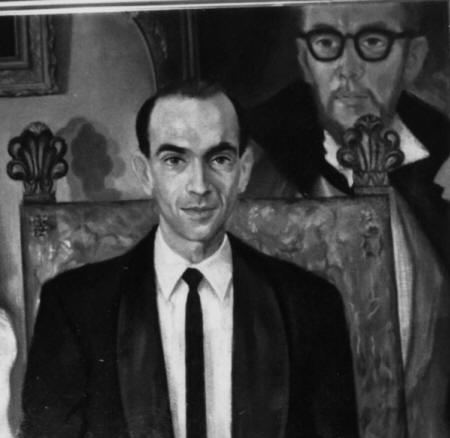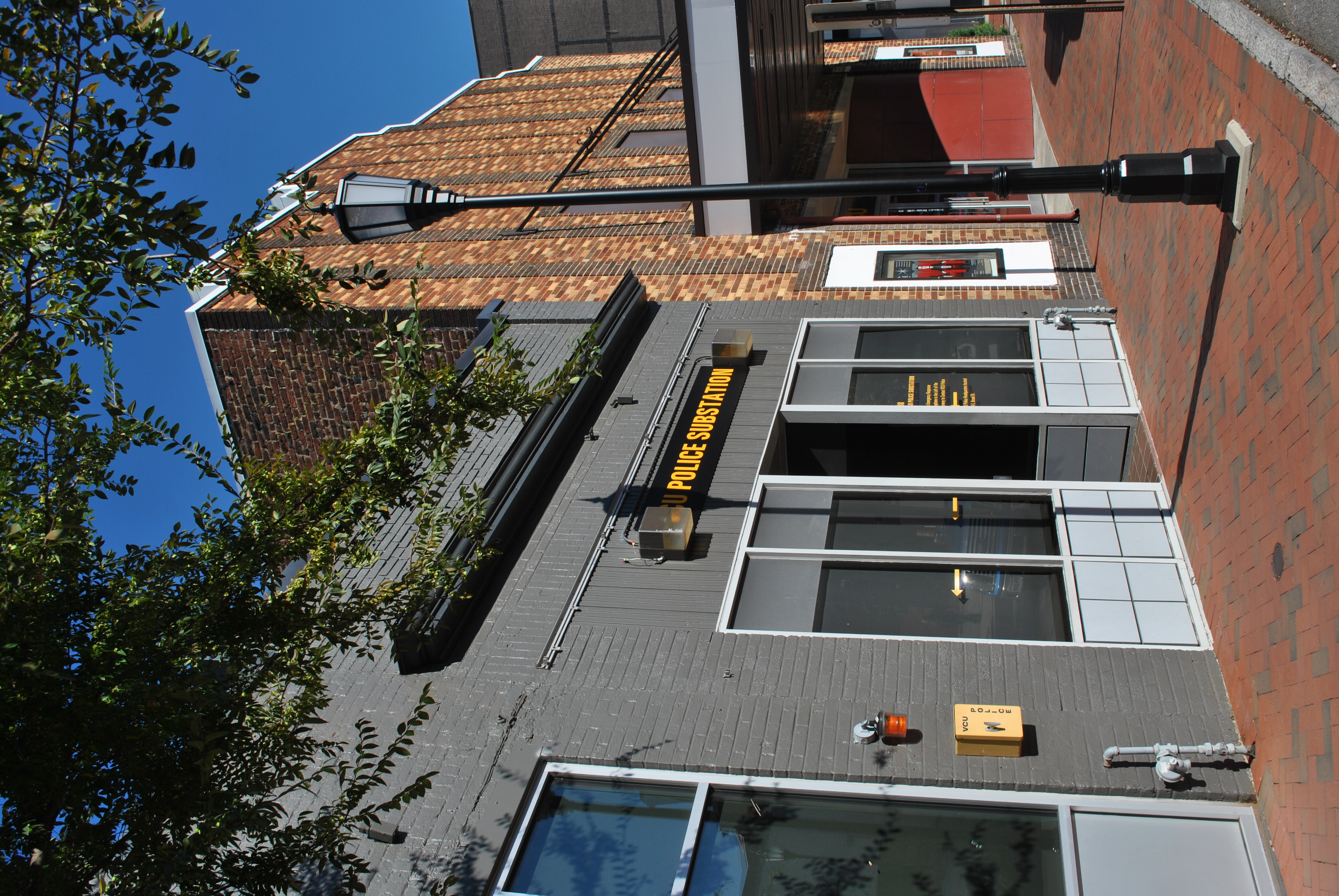Partner Marsh Harris
Queer Places:
Emory University, Boisfeuillet Jones Center, 201 Dowman Dr, Atlanta, GA 30322
Columbia University (Ivy League), 116th St and Broadway, New York, NY 10027
23 RIVERSIDE DRIVE
MANHATTAN
Eton's, 938 W Grace St, Richmond, VA 23284
 Gonzálo
Manuel “Tony” Segura (July 28, 1919 - November 25, 1991) was a key figure in the move towards visibility. He
was a founding member of the Mattachine Society in NY and moved to Richmond in 1959. Several years later Segura attempted to form local chapter of the Mattachine Society
in Richmond, but was not successful. Segura later helped found the Richmond Gay Rights Association and wrote for one of the early newsletter The Richmond Pride. Segura’s partner of 30 years
Marsh Harris was a prolific writer of gay pulp fiction in the 1960’s. Unlike most of the formulaic pulp novels, Haris wrote gay love stories with happing endings. Segura would later be involved in numerous gay rights organizations in Richmond.
Gonzálo
Manuel “Tony” Segura (July 28, 1919 - November 25, 1991) was a key figure in the move towards visibility. He
was a founding member of the Mattachine Society in NY and moved to Richmond in 1959. Several years later Segura attempted to form local chapter of the Mattachine Society
in Richmond, but was not successful. Segura later helped found the Richmond Gay Rights Association and wrote for one of the early newsletter The Richmond Pride. Segura’s partner of 30 years
Marsh Harris was a prolific writer of gay pulp fiction in the 1960’s. Unlike most of the formulaic pulp novels, Haris wrote gay love stories with happing endings. Segura would later be involved in numerous gay rights organizations in Richmond.
Gonzálo Manuel Segura was born in Sagua La Grande, Cuba. Segura hailed from a
prominent Spanish Cuban family and arrived in the U.S. in 1935 to study at
Emory University. After graduating in 1942, he remained in the U.S., where he
felt he could lead an easier life as a homosexual. He moved to New York,
where he attended Columbia University and worked as a teacher, chemist, and advertising executive. After reading
Donald Webster Cory’s The
Homosexual in America (1951) in 1955, he contacted homophile groups in Los
Angeles and Europe.
Segura used Cory’s book as a guide to discover other books and bookstores, and wrote to Greenberg Publisher, the leading publisher of gay novels for two decades. He received a list of titles of the Cory Book Service (established 1954), which had the largest gay mailing list in the U.S. Through the book service, he was told of a nascent network of gay organizations, and Segura started doing volunteer work and Spanish translation for the service. He connected in New York with the newly formed The League, a very secretive discussion group of about 30 to 100 gay, mostly professional men, that was started by subscribers to the West Coast’s ONE Magazine, and was partly an outgrowth of the recently-disbanded Veterans Benevolent Association. They met in a loft on Spring Street, until someone alerted the police to the group, which ended up scaring away members in October 1955 (The League was disbanded in 1956). Segura realized the need for an open organization, and was supported by another League member,
Sam Morford, who had contacted the Mattachine Society on the West Coast.

Tony Segura in the middle of back row with Mattachine Society officers in
San Francisco, 1957

Eton's, Richmond, VA
Segura helped to found Mattachine New York, and had a strong relationship with
ONE Magazine. The New York Area Council of the Mattachine Society, Inc., the
fifth such council nationally, was started on December 10, 1955, by Segura and
Morford at Morford’s apartment at 16 East 8th Street in Greenwich Village. By
1953, Segura was living on the Upper West Side, at 23 Riverside Drive, and so
was residing there when the New York Council was founded. Segura aided ONE’s
distribution efforts in New York. He translated a number of articles and
helped ONE in its business dealings in Mexico and Latin America. In the spring
and summer of 1955, Segura encouraged ONE, Inc. to publish a Spanish-language
edition in Mexico City. He reviewed Spanish-language publications and helped
to recruit a community of Latino readers across the U.S. and Latin America.
At the national Mattachine meeting held in May 1956, Morford (the New York Council chairman) was elected Research Director, and Segura was elected Public Relations Director. Segura was also largely responsible for the first international edition of Mattachine Review in October 1956. After Morford’s departure from New York in May 1957, the New York Council was run by Joe McCarthy as chairman (he also served as national Mattachine chairman in 1958) and Segura as vice chairman (he was credited as being the main person running the group early on, despite Morford being the chairman).
Segura was also on the editorial board of Mattachine Review, and traveled around the country speaking at various councils. He was the first openly gay man on television on the East Coast on March 10, 1958 – on a panel with sexologist Albert Ellis on WABD’s “Showcase” – though under an assumed name and wearing a hood. In 1959, Segura traveled to Mexico City to meet with publishers to increase
ONE’s circulation there and to explore possibilities for other publishing
ventures.
Segura left the Riverside Drive apartment the year he moved to Richmond, Virginia, in 1959.
Segura receded into obscurity after relocating with his lover to Virginia,
where he subsequently organized gay pride observances in the 1970s. Segura
mediated between homophile factions and his correspondence reveals the
important role he played as a sexile, bicultural, bilingual person who bridged
the racial, class, ethnic, regional, and national divides of the American
homophile movement. His work reveals the transnational efforts of homophile
groups and the importance of complex “queer loyalties” to activists’ success.
My published books:


BACK TO HOME PAGE
 Gonzálo
Manuel “Tony” Segura (July 28, 1919 - November 25, 1991) was a key figure in the move towards visibility. He
was a founding member of the Mattachine Society in NY and moved to Richmond in 1959. Several years later Segura attempted to form local chapter of the Mattachine Society
in Richmond, but was not successful. Segura later helped found the Richmond Gay Rights Association and wrote for one of the early newsletter The Richmond Pride. Segura’s partner of 30 years
Marsh Harris was a prolific writer of gay pulp fiction in the 1960’s. Unlike most of the formulaic pulp novels, Haris wrote gay love stories with happing endings. Segura would later be involved in numerous gay rights organizations in Richmond.
Gonzálo
Manuel “Tony” Segura (July 28, 1919 - November 25, 1991) was a key figure in the move towards visibility. He
was a founding member of the Mattachine Society in NY and moved to Richmond in 1959. Several years later Segura attempted to form local chapter of the Mattachine Society
in Richmond, but was not successful. Segura later helped found the Richmond Gay Rights Association and wrote for one of the early newsletter The Richmond Pride. Segura’s partner of 30 years
Marsh Harris was a prolific writer of gay pulp fiction in the 1960’s. Unlike most of the formulaic pulp novels, Haris wrote gay love stories with happing endings. Segura would later be involved in numerous gay rights organizations in Richmond. 

